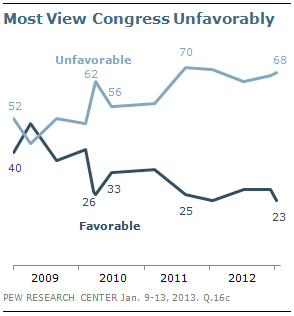
As the 113th Congress gets underway, the favorable ratings for the legislative branch match lows from more than two decades of Pew Research Center surveys. Just 23% of Americans say they have a favorable opinion of Congress. Nearly seven-in-ten (68%) have an unfavorable view.
Four years ago, as Obama came into office, 40% said they had a favorable opinion of Congress, while about half (52%) had an unfavorable one. Opinion improved somewhat in the spring of 2009 – 50% offered a favorable view of Congress that April – but has hovered near long-time lows for much of the past two years. The ratings have fluctuated only slightly in recent months, despite the prolonged standoff over the fiscal cliff.
Democrats, Republicans and independents all hold broadly negative views of Congress: 61% of Democrats say they have an unfavorable view of Congress, compared with 72% of Republicans and 73% of independents.
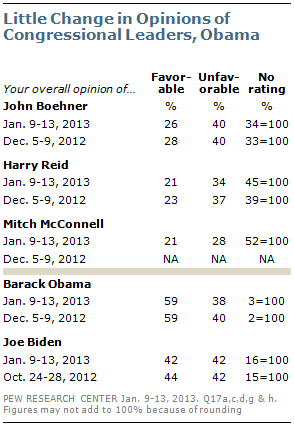
The favorability ratings for three top congressional leaders – John Boehner, Harry Reid and Mitch McConnell –also are on balance, negative. Opinions of these three leaders, like views of Obama and Joe Biden, are little changed following passage of legislation to avert the fiscal cliff.
About a quarter (26%) have a favorable impression of House Speaker John Boehner, 40% offered an unfavorable view and 34% do not give a rating. About two-in-ten (21%) say they have a favorable view of Senate Majority Leader Harry Reid; 34% express an unfavorable view and 45% offer no opinion. The numbers are similar for Senate Minority Leader Mitch McConnell: 21% have a favorable view, 28% unfavorable and 52% offer no opinion.
Republicans, on balance, offer more favorable than unfavorable impressions of Boehner (45% vs. 30%), though 25% offer no opinion. Opinion among Republicans about McConnell is more evenly divided: 25% favorable vs. 25% unfavorable. About half (49%) offer no opinion.
Democrats also offer divided impressions of Reid; 29% have a favorable opinion of the majority leader and 20% have an unfavorable one. About half (51%) offer no opinion.
GOP Image Woes Persist
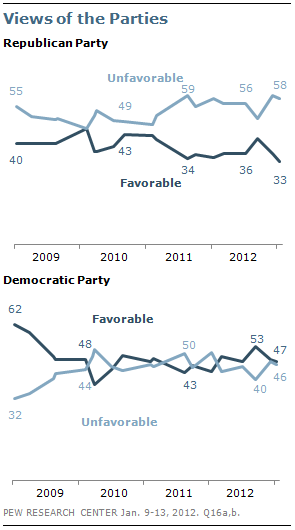
Just a third of Americans (33%) say they have a favorable opinion of the Republican Party, about the same as the lows recorded in August 2011 (34%). Nearly six-in-ten (58%) say they have an unfavorable view of the GOP. Four years ago, opinion was only slightly better. In January 2009, as Obama started his first term, 40% had a favorable opinion of the Republican Party, while 55% held an unfavorable one.
Currently, the public is divided in views of the Democratic Party: 47% have a favorable opinion, while 46% have an unfavorable one. Impressions of the Democrats were much more positive in early 2009. That January, 62% said they had a favorable view of the party, while 32% reported an unfavorable view.
The public’s views of the parties’ ideologies have changed little since the summer of 2011. Currently, 23% see the Republican Party as very conservative, while 32% see it as conservative. About two-in-ten (22%) describe the Republican Party as moderate, 8% say liberal and 6% say very liberal. The percentage that sees the GOP as very conservative, while little changed since August 2011, is up from 17% in June 2010.
Views of the Democratic Party’s ideology also have remained fairly stable; 22% see it as very liberal, 31% say liberal and 27% say moderate. One-in-ten (11%) say it is conservative, while 2% say it is very conservative.
Shifting Views of Political Compromise
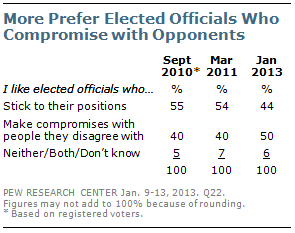
When Americans are asked whether they prefer elected officials who stick to their positions or those willing to compromise, the balance of opinion has shifted since early 2011. Currently, 50% say they like elected officials who make compromises with people they disagree with rather than elected officials who stick to their positions (44%). In March 2011, 54% said they preferred those who stick to their positions and 40% preferred those who compromise.
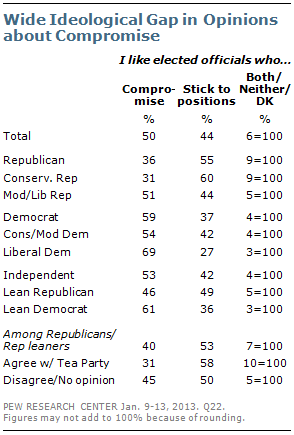
While a majority of Republicans say they prefer elected officials who stick to their positions (55% vs. 36%), the balance is flipped among Democrats and independents. About six-in-ten Democrat (59%) now say they like elected officials who compromise with people they disagree with, while 37% prefer officials who stick to their positions. Among independents, 53% like those who compromise, while 42% prefer those who stick to their positions.
By a wide margin (69% to 27%), liberal Democrats prefer politicians who make compromises with those whom they disagree. By contrast, 60% of conservative Republicans like elected officials who stick to their positions, while just 31% like those who compromise.
Among independents, there are wide differences tied to party leaning. About six-in-ten independents who lean Democratic (61%) say they like those who compromise, compared with 46% of those who lean Republican.
Public Sees More Partisan Conflict Ahead

Just 23% of Americans say they expect Republicans and Democrats to work together to solve problems this year. That’s about half the number that said this as Obama took office in January 2009 (50%) and down 7 points since the start of 2011.
Two-thirds (66%) say Republicans and Democrats in Washington are likely to bicker and oppose one another more than usual. Just 39% said this in January 2009. Still, that number has changed little in the past two years. It stood at 63% in January 2011.
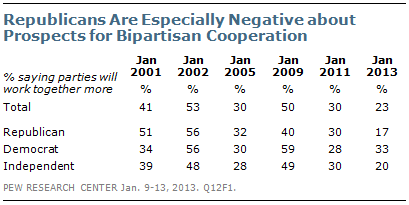
Among partisans, 73% of Republicans expect the parties to fight more than usual, compared with 59% of Democrats and 68% of independents. Just 17% of Republicans say the parties will work together more. That is down from 30% in early 2011 and 40% in early 2009. A third of Democrats (33%) agree, little changed from early 2011 (28%), but down sharply from early 2009 (59%). Among independents, 20% say the parties will work together more; nearly half (49%) said that in early 2009.
Views of Parties on Issues
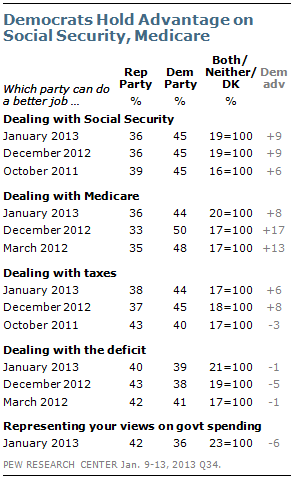
Democrats hold an edge when the public is asked which party can do a better job dealing with social welfare programs such as Social Security and Medicare. The parties run about even on which would do a better job dealing with the deficit and which would better represent their views when it comes to government spending.
More than four-in-ten (44%) say the Democratic Party can do a better job dealing with Medicare, while 36% choose the Republican Party. The Democratic advantage is down slightly from December.
On the other issues tested, changes were modest. Democrats maintain a nine-point edge on dealing with Social Security (45% vs. 36%). On taxes, 44% say the Democrats can do a better job, while 38% say Republicans can.
When it comes to dealing with the deficit, the parties run about even: 40% say the Republicans can do the better job, while 39% say the Democrats can. And when asked which party better represents your views on government spending, the public is about evenly divided: 42% say the Republicans and 36% say the Democrats.